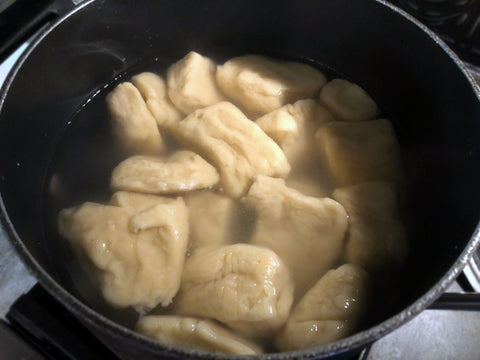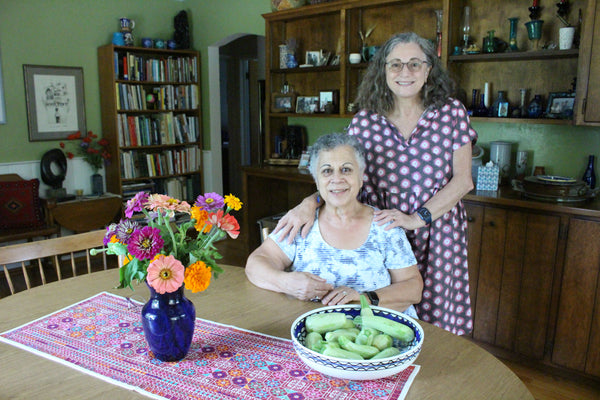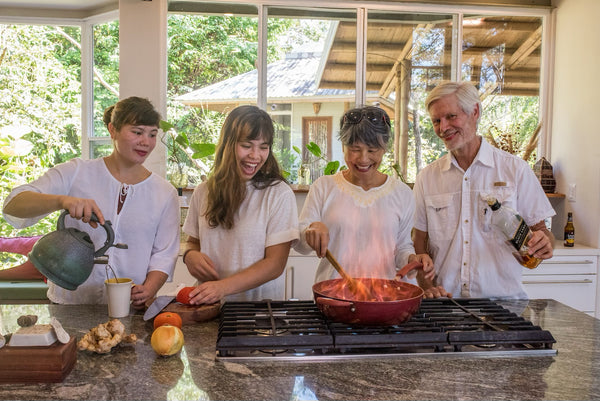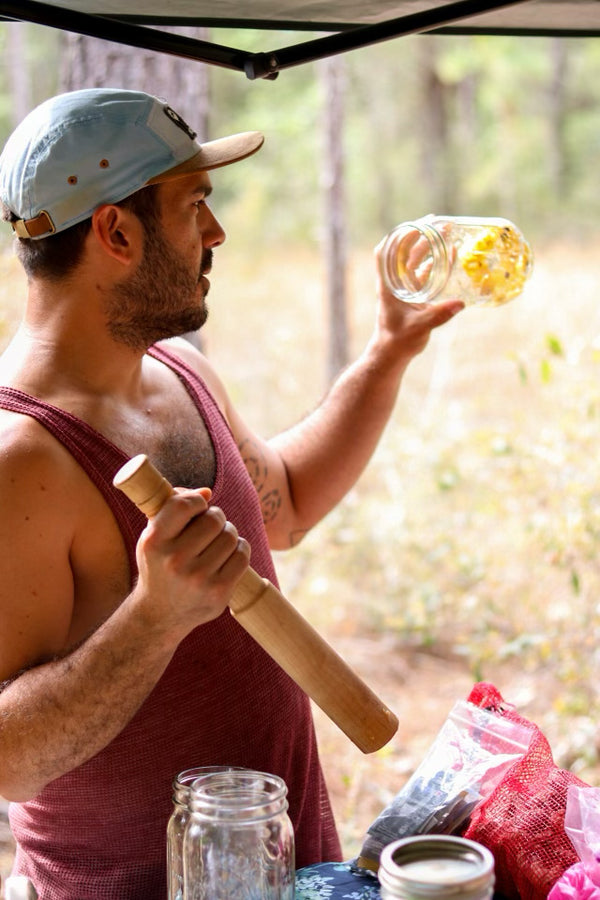This month, we’re getting a taste of Czech cuisine via my wonderful mother, Sandy Pernecky. As we head into cooler weather, it feels right to be thinking of hearty soups, meat-and-potatoes, gravy, and comforting sweet-and-sour meals, which are all staples of traditional Czech cooking. The Czech Republic, located in central Europe, has fairly cold and snowy winters, and so warm and comforting foods are the norm. My mom is the granddaughter of Czech immigrants, and has many fond memories of one of our family’s traditional holiday meals, made of roast duck, sweet-sour cabbage, and potato dumplings. And, of course, as is notorious in Czech cuisine, plenty of gravy and grease from the duck to top everything off! This past month, I delved into my own ancestral heritage a bit and was deeply rewarded and fulfilled by what I found.
My mother's earliest memories of these foods go back to her childhood summers spent on her grandparents’ farm in Phillips, Wisconsin. Her grandma, whom she called Babí, and her grandpa, had immigrated from the Czech Republic in the 1920s, first to Chicago and then to northern Wisconsin, where they settled down to live on a farm in Phillips. In one of mom’s journal entries reflecting on Babí and Grandpa’s way of life, she writes:
"This was a time when foods were made from scratch, stored, and not wasted. Milk was whole fat, fresh, and not pasteurized. Raspberries were wild and picked from the patches where they grew… The small apple orchard, within the farm property, provided all that was needed for apple strudel, raw apples, apple dumplings, and applesauce… Both Babí and Grandpa were able to recognize certain wild mushrooms, so mushroom foraging was an annual activity when fall rolled around. Vegetables from their garden were pickled, canned, and otherwise preserved for the long, cold winter months, and were kept in the basement, which was earthy and cool, and kept foods well into Spring."
Growing up in Waukesha, Wisconsin, my mother and her family weren’t able to make it up to Phillips for Christmas with extended family, so they instead celebrated their Czech heritage at their home in Southern Wisconsin by cooking the traditional roast duck, sweet-sour cabbage, and potato dumplings meal. The duck is roasted for several hours, and the house is permeated with the smell of the meat getting cooked through and the skin crisping up. Making good sweet-sour cabbage is really an art; to find the perfect balance of salt and vinegar, the perfect amount of dried dill, and to not over-or-undercook it, requires sensitivity and experience. As for the potato dumplings; to get the right balance of potato and flour, to shape them lovingly, and to plop them into the waiting boiling water so that they don’t stick together, is really a practice in mindfulness. As she gives the potato dumplings a stir, mom tells me that cooking these foods reminds her of the holidays, and gives her that warm and fuzzy feeling of being together with family, and of “those earlier days, that on the surface, seemed simpler.”



Having been a lecturer at Eastern Michigan University since 2004 and taught a Food & Culture class through the Dietetics Department for over a decade, my mom brings a more academic perspective about her ancestor’s food traditions to the table, as well. In the Czech Republic, she says, “it’s all about those heartier foods.” Czech farmers, especially, will eat a much larger lunch than breakfast or dinner, as they’ll have been up since 5am doing farm chores and will need substantial calories to get through the rest of the day. So breakfast and dinner were much smaller affairs. This is common in many farming/peasant cultures around the world.
My mom's first memories of this meal were of watching Babí make it. “Babí’s English wasn’t as comfortable as her native language, and Grandpa even less so, so I’d mostly learn from observation.” Cabbage, potatoes, and dill were staples in Babí’s garden, and for a while, they kept pigs as a source of meat. These all went into the traditional pork-cabbage-dumpling meal that Babí would cook. Additionally, my mom’s dad was a cook in the army, and took an interest in learning more about the Czech ways of cooking. Each year for several years, he went up to the annual Czech Fest in Phillips, where there is a large community of Czech people, to learn more about their food traditions and culture. He passed on some of this knowledge to my mom, and still cooks and bakes many of these foods. Some of his specialties include hoska (a sweet, braided raisin bread), kolaches (a sort of “Czech danish”), chicken paprika, and beef omacka. Her mom, Dasa, familiarized the family with fruit dumplings, cauliflower soup, and dill soup.
I was fortunate enough to visit some of my distant relatives in the Czech Republic with my brother, Joseph, in 2019. I remember the first thing I ate with my family at a restaurant in Prague was roast duck, dumplings, and sweet-sour cabbage, served with a thick gravy and a delicious Czech beer. I was instantly transported back to Christmas dinners with my mom’s side of the family in Waukesha. There was this sense of homecoming that started at that moment and grew throughout the duration of my time there, as I experienced the food, the people, and the land itself. It was a part of myself that was not quite “me,” but deeper. It almost felt as though my ancestors really do still live within me, and were filled with deep joy at coming home to their ancestral lands. It nourished me in a way I can’t quite explain, but was deeply fulfilled by.
Michaela Kojecka, my distant cousin who still lives in the Czech Republic, confirms that a traditional meal that is most popular for lunch and that “every Czech knows” is Vepřo-knedlo-zelo, which means “roast pork, dumplings, and sauerkraut.” This is a variation of the meal I interviewed my mom about; hers features duck, while this one uses pork. Duck is considered more suitable for holidays or special occasions.
As my mom and I cooked the afternoon away, I found myself relishing in the delicious and comforting smells of the duck roast mingling with sweet-sour cabbage. The gentle bubbling of the potato dumplings riding the boiling water gave a pleasant ambiance to the day. My mom and I both agreed that it was extremely cathartic to cook and talk about these foods, our family, and our traditions together. It filled our souls up to know that this is what our ancestors would have eaten way back when, and that we are somehow carrying on that legacy. Even though we don’t know much about them, we could feel a connection to our ancestor through honoring the food traditions that had been passed down to us through the ages. I feel a similar feeling when I look at the night sky - that my ancestors sang and celebrated around the bonfire together under the same moon and stars. To me, this feeling of connection and interdependence seems very real, and very necessary, to being human.
By Grace Pernecky
P.S. Check out the recipes for this meal! Click here for roast duck, here for sweet-sour cabbage, and here for potato dumplings.

Pictured: Grace's parents, grandmother, Grace (at camera), and Alex, Grace's partner, all join together to enjoy a traditional comforting Czech meal.




